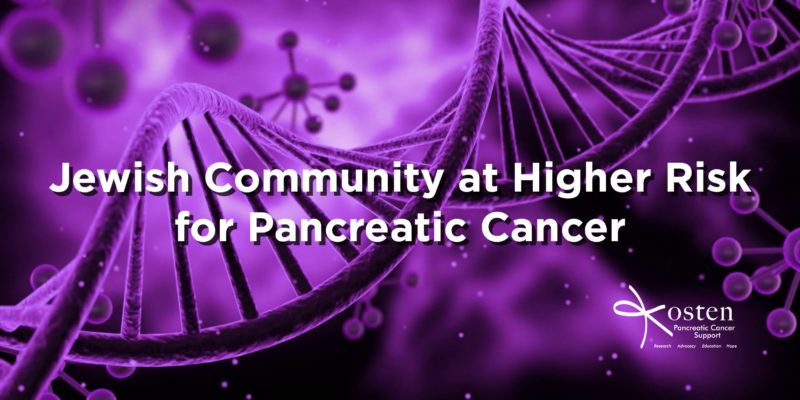
Jewish Community at Higher Risk for Pancreatic Cancer
Research has shown that people who carry mutations in the BRCA1 and BRCA2 genes (typically associated with breast and ovarian cancer) have a higher risk of several types of cancer, including the rare and deadly pancreatic cancer. While the proportion of specific harmful BRCA1 and BRCA2 mutations varies among individual racial and ethnic groups, people of Ashkenazi Jewish descent have been proven to have a higher prevalence of mutations in both genes. According to the National Cancer Institute, 1 in 40 Ashkenazi Jews, both men and women carry a BRCA gene mutation — more than ten times the rate of the general population, significantly increasing their risk of developing pancreatic cancer.
“I had no idea about the increased risk for pancreatic cancer for members of the Jewish community,” says Alan Kosten, Chairman of the Herb Kosten Pancreatic Cancer Charitable Fund and an active member of the Jewish community of faith Memphis, Tennessee. “The Kosten family and the Kosten Foundation have been advocating for greater awareness of pancreatic cancer ever since my brother, Herb, passed away from the disease in 2003. This news is something that really hits home for us and has made us take an even closer look at this disease, not just for ourselves, but for the many members of the Jewish community here in the Mid-South and other areas.”
Pancreatic cancer is the third leading cause of cancer-related deaths each year and, while it represents only two percent of all cancers, it is responsible for 40 percent of all cancer deaths. What makes pancreatic cancer challenging to treat is that people often do not recognize the symptoms until they are advanced.
According to the National Cancer Institute, “Pancreatic cancer is difficult to detect and diagnose for the following reasons:
- There aren’t noticeable signs or symptoms in the early stages of pancreatic cancer.
- The signs and symptoms of pancreatic cancer, when present, are like the signs and symptoms of many other illnesses.
- The pancreas is hidden behind other organs such as the stomach, small intestine, liver, gallbladder, spleen, and bile ducts.”
While many people may have a BRCA mutation, the percentage of those who are actually aware of it is small which means they also likely do not know about the increased risk of pancreatic cancer. It is for these reasons that genetic testing is crucial.
Genetic testing is essential, especially given the higher risk among members of the Jewish community. Something as simple as an at-home test could reveal the probability of developing pancreatic cancer in both men and women, or any of several other deadly cancers because of harmful mutations in BRCA1 and BRCA2 genes. These include breast and ovarian cancer in women and prostate cancer in men.
A private physician can order most at-home tests. The tests typically include a saliva collection kit and a prepaid return label in which to send your sample back. Whatever form of testing you choose, it is important to review your results with a genetic counselor.
It is also important to remember that just because you may test negative for BRCA1 or BRCA2 does not necessarily mean you are in the clear. Many genes influence hereditary cancer syndromes. If you see patterns in your family, even if you test negative for BRCA1 and BRCA2 mutations, it’s important to discuss your family history with a genetic counselor.
If you need help finding resources or need support in dealing with a pancreatic cancer diagnosis, the Kosten Foundation for Pancreatic Cancer Support, located in Memphis, Tennessee, is available and ready to help. The organization is the only one of its kind between St. Louis and Atlanta and was founded in 2003 by the family of Herb Kosten after his death due to pancreatic cancer. Kosten’s family sought to improve community support, awareness, and funding for pancreatic cancer, one of the deadliest known cancers. The organization has raised close to $2,000,000 for pancreatic cancer research and hosts a very active monthly support group meeting for patients, their families, and anyone interested in learning more about pancreatic cancer. Money raised from Kosten Foundation events helps fund pancreatic cancer research and support fellowship training for future pancreatic cancer surgeons at the University of Tennessee Health Science Center. For more information about the Kosten Foundation, its programs, and events, visit the website at kostenfoundation.com.